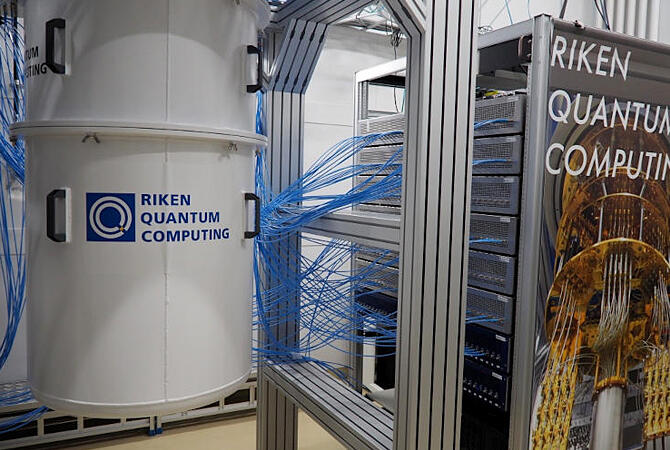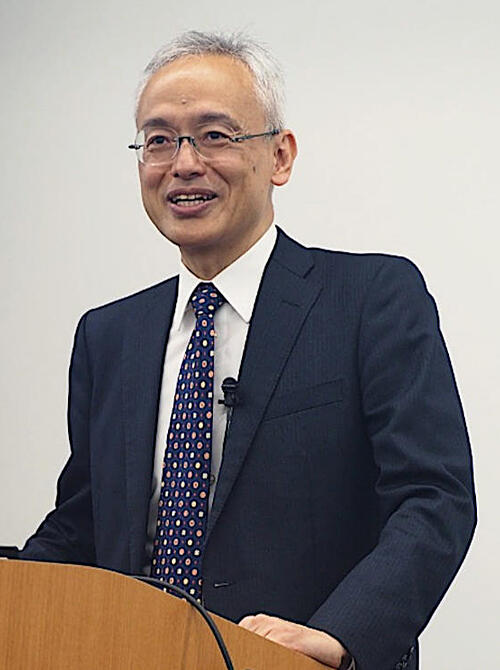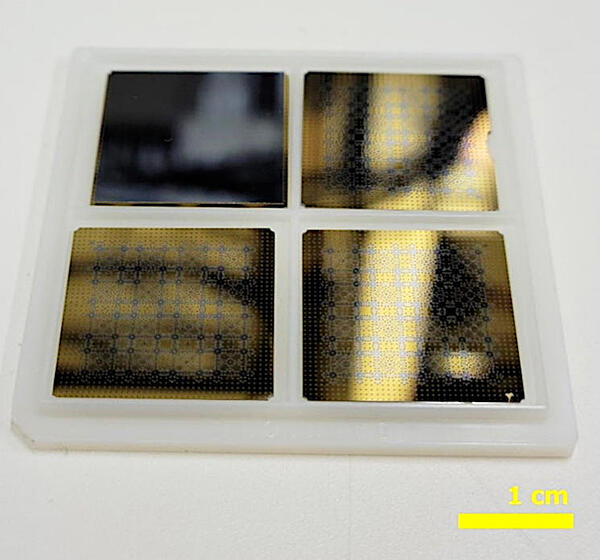Quantum computers are expected to be able to perform calculations that far surpass supercomputers in the future. The first prototype produced domestically in Japan was developed by a group that included RIKEN and other research institutes, and on March 27, a 'quantum computation cloud service' that could be used by external research institutes was launched. While research and development is accelerating in the United States of America, China and other countries, the goal is to expand the use of this technology, advance the sophistication of the hardware and software, search for applications and promote the development of human resources and other areas.

Taken on March 27, RIKEN in Wako City, Saitama Prefecture
The first domestically produced machine was installed at RIKEN in Wako City, Saitama Prefecture. The 64‐qubit integrated circuit chip, which is the basic unit used for quantum computing, is housed in a magnetic shield. This is then placed in a refrigerated enclosure, cooled to near absolute zero and connected to a control unit.
At a press conference held on the same day, Director Yasunobu Nakamura of the RIKEN Center for Quantum Computing said, "Computational technology is evolving rapidly, and there are an infinite number of problems that mankind wants to solve. Quantum computers are attracting attention as a potential solution to this. The first domestically produced quantum computer is still small and limited in what it can do. This machine will allow researchers and engineers with various interests to bring their ideas together, try them out and expand them into different fields. We would like to receive feedback and improve our system."
The use of superconductors in the qubits was adopted and at present, 53 of the 64 elements are working. The 11 that have problems will be updated. These are arranged on a planar surface, with the signal wires mounted perpendicular to the plane. This is said to be a device that will allow for the easy expansion of qubits in the future.
The research was conducted by RIKEN, the National Institute of Advanced Industrial Science and Technology (AIST), the National Institute of Information and Communications Technology (NICT), the University of Tokyo, Osaka University, Fujitsu, Nippon Telegraph and Telephone Corporation (NTT) and others under the 'Quantum Leap Flagship Program (Q‐LEAP)' project. This project has also received support from the Japan Science and Technology Agency (JST) under the 'Strategic Basic Research Programs' (until March last year), as well as from other sources.

For the time being, cloud services are available for non‐commercial use related to research and development, such as in the field of quantum computing. Its use is free of charge with registration and can be used externally via the Internet. In the future, the target will be expanded by stabilizing and expanding the system.
Quantum computers perform calculations based on 'quantum mechanics,' the laws of physics in the 'quantum' world, such as the atoms and electrons that make up matter. Conventional computers represent 0s and 1s using high and low voltages applied to semiconductors and operate as binary systems. Quantum computers, on the other hand, utilize the overlapping and simultaneous existence of 0s and 1s in the world of quantum mechanics to parallelize a large number of calculations. Because the amount of information in society continues to increase dramatically, there is a limit to the miniaturization of semiconductors using existing technology, and quantum computers are expected to be a fundamental technology that realizes innovative information processing.
The power of supercomputers is expected to be shown in solving complex problems that are computationally demanding. Possible fields of application include chemistry, drug discovery, medicine, energy and materials. It is also expected to be used in areas such as artificial intelligence, finance and logistics. The importance of this technology in relation to security is also recognized because if it is used for decryption, this could lead to the leakage of government and corporate secrets.
This technology has been developed by Google, IBM, the University of Science and Technology of China and Zhejiang University to date. Japan, which has been lagging, will work together with industry, academia and the government to accelerate the process through the use of the developed equipment. However, it is said that one million qubits will be required for full‐scale practical use. Technology to correct calculation errors and sophisticated control technology are also major issues, and the road to practical application is likely to be quite long.
Nakamura said, "Realization of this project is a challenging task. Many teams around the world are at the cutting edge, but the technology still has a long way to go (it will take time). There is still plenty of room for us to contribute."

(provided by RIKEN)
Quantum computers are expected to be a fundamental technology that will support the future of society. Because research and development is indeed a long‐lasting endeavor, it will be a major challenge to nurture excellent researchers and steadily replace them with new generations. It is expected to be useful in our daily lives and positively impact many areas of the industrial economy as the technology base expands. We will keep watching how much Japan will improve its capabilities.
(KUSAKA Takeo / Science Portal Editorial Office)
Original article was provided by the Science Portal and has been translated by Science Japan.




